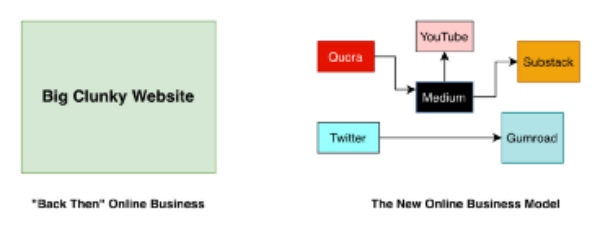"Websites are dead" is NOT the whole picture
Websites may look dead if you only look at them SHORTLY enough.
About one year ago, R. Stux wrote that Websites Are Dead (and Nobody Has Noticed). In that post, he argued that everything seems to suggest that websites going extinct, because, basically:
- he has not visited a traditional website for a long time, and mostly sees “content” through centralized, specialized platforms like YouTube, Medium and Twitter
- all his favourite online creators get fame and money in the same way, without any need of a website, thank you very much
- modern entrepreneurs need ask themselves only “how to use existing tools and platforms to achieve their goals in the most efficient way”
In practice, Stux recommends to just jump from the “Back Then” business model on the left of this picture to the new model on the right:

I beg to disagree, and I hope you do too
I do use Twitter, LinkedIn, Facebook and other similar platform for my work, and you are all welcome to contact me there. And there is no doubt that one can get recognition and income by only using certain platforms.
But I am not all, or primarily inside those platform, and never will. Unless the Web as it is today really disappears, I will continue to work in the “Back then” model, using the “modern” one only to syndicate what I do there. The main reason is that…
Online, “Back then” is the new “Back to the Future”
I do use (Free/Open Source) “existing tools and platforms”. I just use them to build this and my other main website in the old fashioned way. Why? The first, low level reason is permanence of past work. Anything I only published on any third party “platform” in the past, even if that “past” is just last week, is either unvisible to potential readers (including search engines), or at addresses that may disappear or change at any moment.
Publishing what I had to say on a certain topic here, instead, lets me just paste the URL today, whenever I need to re-submit the same concepts on Twitter, Facebook, YouTube and so on. What I put here 15 years ago is still 100% usable and reachable by everybody today, always at the same address. And never stopped being so.
The other reason to stick to plain old clunky websites is permanence, again, but this time as in “confidence about the future. You can call it clunky as much as you wish, but a clunky website remains way, way less likely to disappear than an account with any centralized “tool or platform”. OK, to be really precise what is way less likely to disappear is the actual content, and all the work you put into organizing it.
That is, if you have built an actual website it is infinitely easier to move it whole to a new address, or to extract and reuse its content elsewhere, without losing any metadata. Try to do that with years of work done only in InstaGram, YouTube, Twitter and so on. Or to just migrate all that work from one “modern” platform to another, or to keep several platforms synchronized, without using even more tools that may stop working at any moment. When, NOT “if”, those tools or platforms will stop working, or wanting you as an user.
New online business models? Thanks, but no thanks. Go POSSE, instead.
Who writes this, why, and how to help
I am Marco Fioretti, tech writer and aspiring polymath doing human-digital research and popularization.
I do it because YOUR civil rights and the quality of YOUR life depend every year more on how software is used AROUND you.
To this end, I have already shared more than a million words on this blog, without any paywall or user tracking, and am sharing the next million through a newsletter, also without any paywall.
The more direct support I get, the more I can continue to inform for free parents, teachers, decision makers, and everybody else who should know more stuff like this. You can support me with paid subscriptions to my newsletter, donations via PayPal (mfioretti@nexaima.net) or LiberaPay, or in any of the other ways listed here.THANKS for your support!